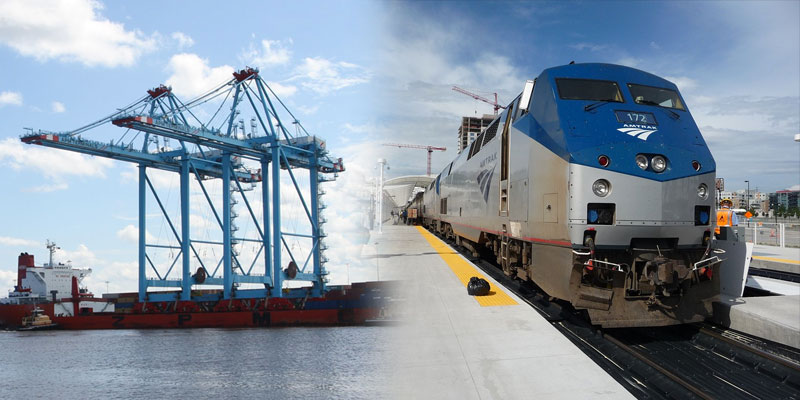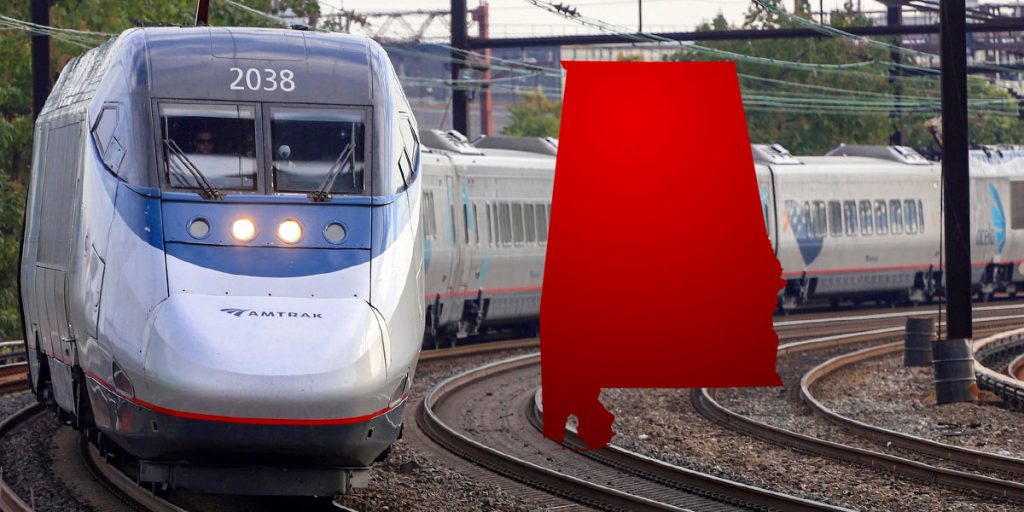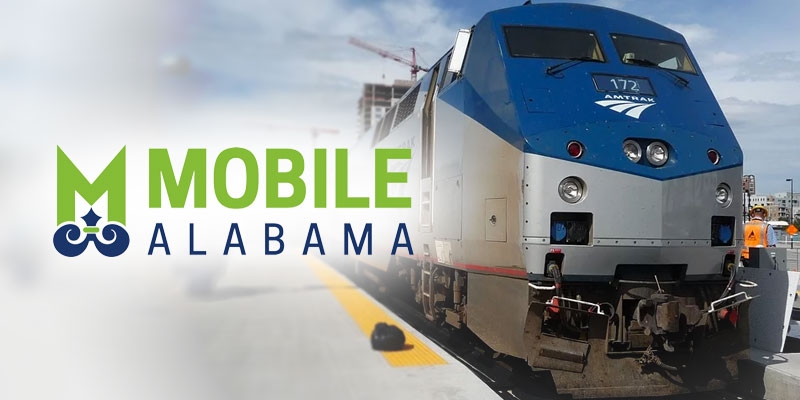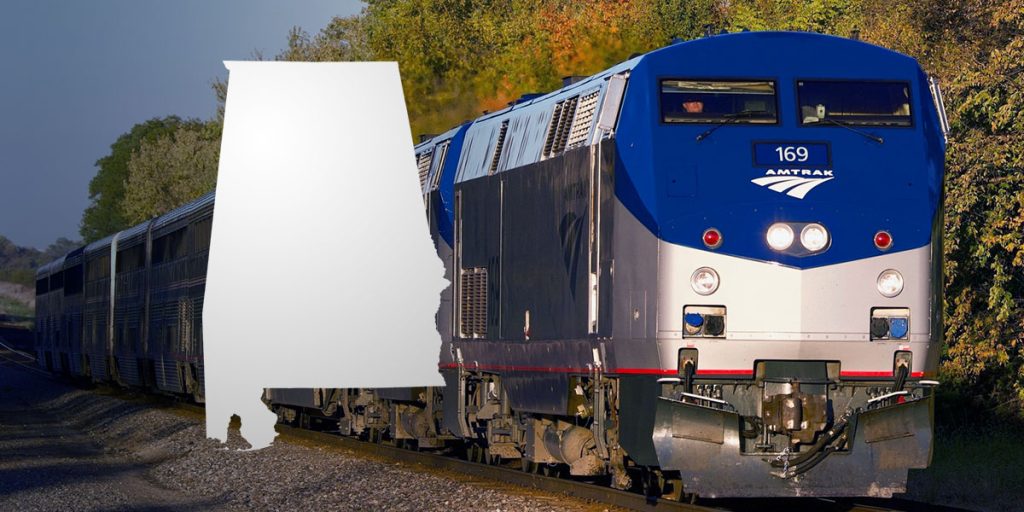MOBILE — The Mobile City Council on Tuesday is set to consider a resolution that could pave the way for taxpayer funds being spent on the controversial Gulf Coast Passenger Rail project.
This will come after the council’s finance committee a week prior heard testimony from various stakeholders about the project, including potential pitfalls.
The project has been criticized as “putting the cart before the horse” by the Alabama Railway Association, the Port of Mobile, CSX and many industries across the state that rely on the port and/or freight rail because a freight rail impact study has not been conducted to determine the effects the project would have on related commerce.
This was again emphasized at last week’s finance committee meeting, with Alabama State Port Authority director and CEO Jimmy Lyons, CSX regional vice president of state government affairs Jane Covington, Alabama Coal Association president Patrick Cagle and Mississippi Export Railroad Company president and CEO Kate Luce advocating that due diligence be done before rushing ahead on a project that could have a negative impact on Mobile’s and Alabama’s economies.
‘Important lingering questions’
The rail impact study would assess infrastructure needs to accommodate passenger rail and any impact on existing freight rail service. In Alabama’s portion of the project pathway, CSX owns the tracks.
CSX and Amtrak, which would operate the proposed passenger rail service, have agreed to terms on how this impact study would be done. On the other hand, Norfolk Southern (which owns tracks elsewhere on the proposed route) has not yet agreed to terms with Amtrak, and since it will be a joint study, it will not begin until Norfolk Southern and Amtrak come to terms. This is expected imminently, and the study will take approximately six months to conduct from the finalized agreement date.
During the finance committee meeting, CSX’s Covington explained, “For this passenger rail process, a freight rail impact study is a critical step – and one that has yet to be taken. As a host railroad, CSX would be required to meet on-time performance metrics for passenger rail service – with stiff financial penalties under federal law if those metrics are not met.”
She further stated, “CSX also has contractual obligations to its customers and believes that this freight rail impact study will ensure that a plan is identified for commingling freight and passenger rail without disruption to commerce. We’ve heard a lot about the positive impact some believe this passenger service will have on tourism. At this time, we are unable to compare that with the potential negative impact the service could have on commerce – both rail and water – which are so important to the Port of Mobile and this city and state’s economy.”
One Alabama economic sector with especially a lot at stake is the coal industry. Cagle outlined that the industry generates 50% of the port’s annual revenue. He recounted his attendance at the Southern Rail Commission’s (SRC) September meeting about the project, when he first publicly expressed concerns with the freight rail impact study not having been conducted yet. At that time, a representative from Amtrak very publicly pledged to contact Cagle and work collaboratively through the industry’s concerns. However, Cagle during the finance committee meeting lamented that four months later, no one from Amtrak nor the Southern Rail Commission had followed through on that promise to contact him.
“Instead, the SRC has continued to invest all of it’s efforts into getting financial commitments for their projects rather than prioritizing the studies that will answer the important lingering questions,” Cagle said.
He told the city council members, “We recognize that you and your fellow council members are in a similar position. You have not been given the facts that you need before being asked to pledge the City’s financial support of this project. Just as we would like to see the results of an objective freight rail study, you would like know how much passenger rail will cost the city, and what, if any, return on the investment the city will receive. These are all prudent questions that could be answered sooner, not later.”
Covington also highlighted funding questions in her remarks.
“While there has been considerable conversation about the cost of operating Gulf Coast passenger rail, there has been very little discussion about the necessary infrastructure to host freight and passenger rail – as well as who will pay for that infrastructure and the associated maintenance costs,” Covington noted. “Infrastructure improvements like double tracks and sidings to accommodate increased train traffic must be identified, funded and built for freight and passenger rail to effectively co-exist.”
The city council is currently being asked to fork up $3.048 million to provide the local match for a federal grant the SRC is applying for related to the project.
However, Covington, referring to remarks recently made by a senior Amtrak official, detailed how that could just be the beginning of city funds needed for the project, as well as how this could be the last Amtrak project of its kind to even need local or state funds — potentially a major slap in the face to Alabama taxpayers.
This entire funding picture got even fuzzier within the past week. Last Tuesday, Mr. Ray Lang – the senior director of state government affairs for Amtrak – testified before a Tennessee Legislative Committee about new passenger rail in Tennessee. I appeared before this same committee, and was very surprised by some key points of Mr. Lang’s testimony about the financing of passenger rail. Specifically:
– Lang said the following about funding of Amtrak passenger rail projects: “Our vision is to create a program at the outset that doesn’t require a match. Because the upfront hurdles here have proven to be almost insurmountable for new states to start new service, and we just think to do this you have to do it right and you have to give states 100% federal capital to start these new services… Our proposal that we will be proposing is 100% federal capital.” Lang added, “The grant programs that are in place are woefully insufficient.”
– As for operating deficits of passenger rail and who covers those financial shortfalls, Lang said: “Yes, the law is very clear: the state makes up the difference. The 2008 law… I think the spirit of that was to lower the federal appropriation for Amtrak and so they basically said short-distance trains are funded by the state or they don’t exist. The state makes up the difference, so on the books they break even.”
In total, one council member brought up the point that for the average $18 a passenger would pay to take a trip on the planned Gulf Coast Passenger Rail route, taxpayers would be subsidizing another $180. This is an uncommonly high ratio of taxpayer subsidization, a SRC consultant testified.
Project proponent goes on the attack
Speaking later in the finance committee meeting, a consultant for SRC acting as a proponent of the project took a different tact.
Dan Dealy, who lives in Baldwin County, questioned the relative importance of the Port of Mobile compared to tourism and called out Governor Kay Ivey’s administration. Ivey has made it clear she wants the freight rail impact study conducted before committing state taxpayer money to the project.
Speaking about economic growth in the Mobile area, Dealy said, “It hasn’t all been just the port. We don’t have new restaurants, new places to go at night, new office buildings because we have put in a container terminal. Or because we are building a new roll-on/roll-off facility … ”
He asserted that the Gulf Coast Passenger Rail project is the type of thing that will attract millennials to live in Mobile, thus increasing the city’s economic competitiveness. The Port of Mobile supports an estimated 134,608 jobs, has a $486.9 million tax impact and provides a total economic value of $22.4 billion.
Dealy urged the city council to support a resolution committing “financial support” to the project, whether the freight rail impact study is completed or not — and regardless of what the impact would be on commerce in Mobile and throughout Alabama.
“[The financial commitment to the project has been] already endorsed by the State of Mississippi, State of Louisiana. We’re here because our [Alabama] state government has not made that commitment, because apparently they’re not as willing to make an investment in Mobile as you are,” Dealy claimed.
‘Due diligence’
“There are questions that still remain, and Governor Ivey wants to make certain that we have all the facts before making a commitment to a project that will impact Alabama in the years to come,” Ivey’s press secretary, Gina Maiola, has said previously. “Governor Ivey says that we must do our due diligence and most wisely and effectively use our funds.”
CSX’s Covington also provided an effective rebuttal to Dealy’s assertion in her remarks.
She outlined, “CSX is not opposed to this project. But the SRC appears to be asking Mobile and others to commit money on a ‘cart before the horse’ basis. What is the impact to freight commerce and the Port of Mobile? What is the impact to future economic development in the area? What infrastructure improvements must first be made, and who is paying for it? How much money is needed to fund operations and, who will fund shortfalls to break even? Is Amtrak committed to the current funding model or are they pursuing a 100% federal funding model?”
“This council and the citizens you represent deserve answers to these fundamental questions before making a sizable financial commitment for this project,” Covington concluded.
The Mobile City Council will meet at 10:30 a.m. on Tuesday. A resolution that made any city financial commitment for the project contingent on the freight rail impact study being conducted failed to garner a second during the finance committee meeting last week.
Sean Ross is the editor of Yellowhammer News. You can follow him on Twitter @sean_yhn












